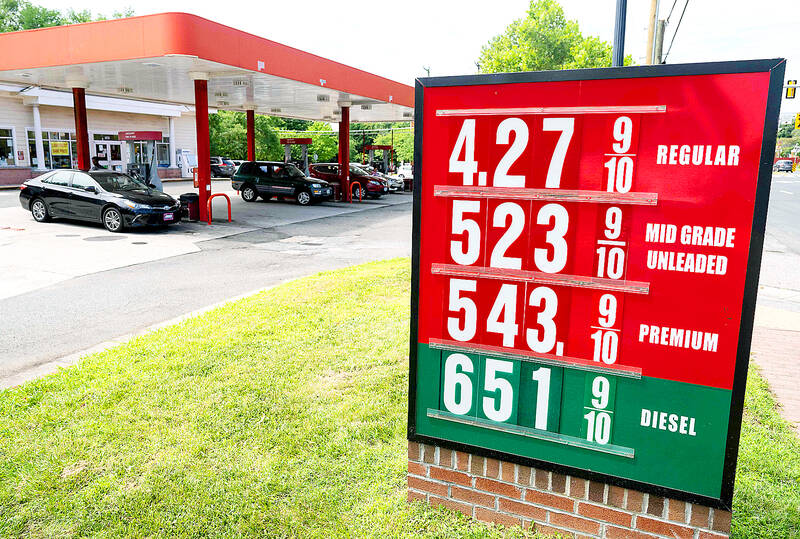US inflation at the wholesale level jumped 8.7 percent last month from a year earlier, a slowdown from July yet still a painfully high level that suggests prices would keep spiking for months to come.
Wednesday’s report from the US Department of Labor also showed that on a month-to-month basis, the producer price index, which measures inflation before it reaches consumers, slid 0.1 percent from July to last month, the second straight monthly decline.
However, the better readings mostly reflect plunging gas prices and do not necessarily point to a broader slowdown in inflation.

Photo: AFP
Core prices, a measure that excludes the volatile food and energy categories, rose 0.4 percent from a month earlier and 7.3 percent from a year earlier.
The cost of services, which are increasingly driving consumer inflation, rose 0.4 percent last month, driven by higher prices for public transportation, car rentals and some financial services.
Still, there were a few encouraging signs in Wednesday’s report. Wholesale food costs were flat from a month earlier, after a 1.3 percent spike the previous month. Moreover, wholesale goods prices overall fell 1.2 percent, suggesting that goods prices for consumers could soon decline.
On Tuesday, the government reported that consumer inflation last month rose across most sectors. Apart from cheaper gas, consumer prices for everything from food and rent to furniture, medical care and new vehicles were pricier last month.
The worse-than-expected consumer price spikes sent the stock market tumbling to its worst day in more than two years on fears that the US Federal Reserve would turn even more aggressive in raising interest rates to fight inflation.
Wednesday’s producer price data capture inflation at an earlier stage of production and can often signal where consumer prices are headed. It also feeds into the Fed’s preferred measure of inflation, which is called the personal consumption expenditures price index.

CHIP WAR: Tariffs on Taiwanese chips would prompt companies to move their factories, but not necessarily to the US, unleashing a ‘global cross-sector tariff war’ US President Donald Trump would “shoot himself in the foot” if he follows through on his recent pledge to impose higher tariffs on Taiwanese and other foreign semiconductors entering the US, analysts said. Trump’s plans to raise tariffs on chips manufactured in Taiwan to as high as 100 percent would backfire, macroeconomist Henry Wu (吳嘉隆) said. He would “shoot himself in the foot,” Wu said on Saturday, as such economic measures would lead Taiwanese chip suppliers to pass on additional costs to their US clients and consumers, and ultimately cause another wave of inflation. Trump has claimed that Taiwan took up to

A start-up in Mexico is trying to help get a handle on one coastal city’s plastic waste problem by converting it into gasoline, diesel and other fuels. With less than 10 percent of the world’s plastics being recycled, Petgas’ idea is that rather than letting discarded plastic become waste, it can become productive again as fuel. Petgas developed a machine in the port city of Boca del Rio that uses pyrolysis, a thermodynamic process that heats plastics in the absence of oxygen, breaking it down to produce gasoline, diesel, kerosene, paraffin and coke. Petgas chief technology officer Carlos Parraguirre Diaz said that in

Japan intends to closely monitor the impact on its currency of US President Donald Trump’s new tariffs and is worried about the international fallout from the trade imposts, Japanese Minister of Finance Katsunobu Kato said. “We need to carefully see how the exchange rate and other factors will be affected and what form US monetary policy will take in the future,” Kato said yesterday in an interview with Fuji Television. Japan is very concerned about how the tariffs might impact the global economy, he added. Kato spoke as nations and firms brace for potential repercussions after Trump unleashed the first salvo of

SUPPORT: The government said it would help firms deal with supply disruptions, after Trump signed orders imposing tariffs of 25 percent on imports from Canada and Mexico The government pledged to help companies with operations in Mexico, such as iPhone assembler Hon Hai Precision Industry Co (鴻海精密), also known as Foxconn Technology Group (富士康科技集團), shift production lines and investment if needed to deal with higher US tariffs. The Ministry of Economic Affairs yesterday announced measures to help local firms cope with the US tariff increases on Canada, Mexico, China and other potential areas. The ministry said that it would establish an investment and trade service center in the US to help Taiwanese firms assess the investment environment in different US states, plan supply chain relocation strategies and